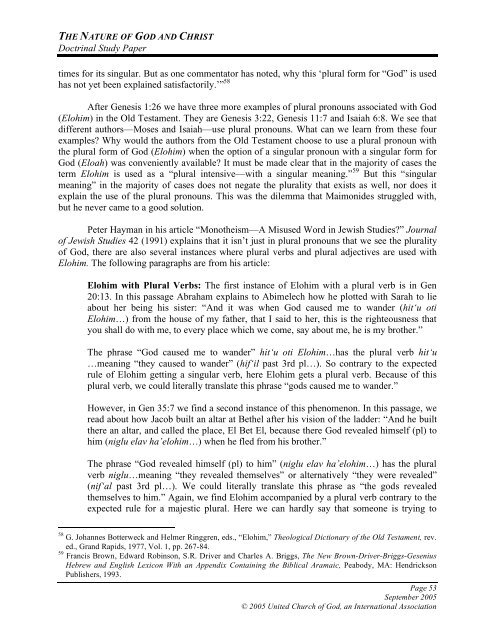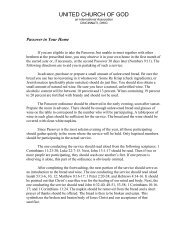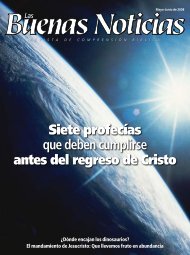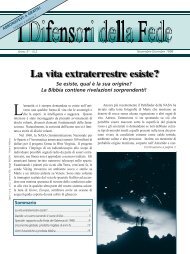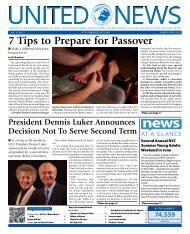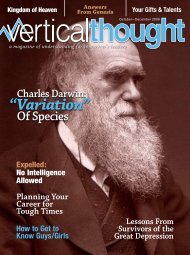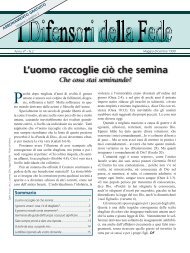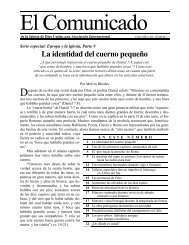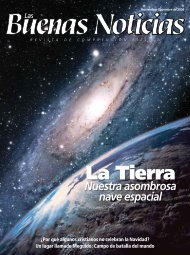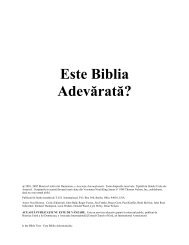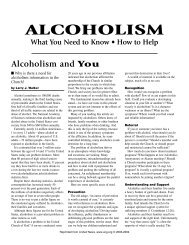The Nature of God and Christ - Members Site - United Church of God
The Nature of God and Christ - Members Site - United Church of God
The Nature of God and Christ - Members Site - United Church of God
- No tags were found...
You also want an ePaper? Increase the reach of your titles
YUMPU automatically turns print PDFs into web optimized ePapers that Google loves.
THE NATURE OF GOD AND CHRISTDoctrinal Study Papertimes for its singular. But as one commentator has noted, why this ‘plural form for “<strong>God</strong>” is usedhas not yet been explained satisfactorily.’” 58After Genesis 1:26 we have three more examples <strong>of</strong> plural pronouns associated with <strong>God</strong>(Elohim) in the Old Testament. <strong>The</strong>y are Genesis 3:22, Genesis 11:7 <strong>and</strong> Isaiah 6:8. We see thatdifferent authors—Moses <strong>and</strong> Isaiah—use plural pronouns. What can we learn from these fourexamples? Why would the authors from the Old Testament choose to use a plural pronoun withthe plural form <strong>of</strong> <strong>God</strong> (Elohim) when the option <strong>of</strong> a singular pronoun with a singular form for<strong>God</strong> (Eloah) was conveniently available? It must be made clear that in the majority <strong>of</strong> cases theterm Elohim is used as a “plural intensive—with a singular meaning.” 59 But this “singularmeaning” in the majority <strong>of</strong> cases does not negate the plurality that exists as well, nor does itexplain the use <strong>of</strong> the plural pronouns. This was the dilemma that Maimonides struggled with,but he never came to a good solution.Peter Hayman in his article “Monotheism—A Misused Word in Jewish Studies?” Journal<strong>of</strong> Jewish Studies 42 (1991) explains that it isn’t just in plural pronouns that we see the plurality<strong>of</strong> <strong>God</strong>, there are also several instances where plural verbs <strong>and</strong> plural adjectives are used withElohim. <strong>The</strong> following paragraphs are from his article:Elohim with Plural Verbs: <strong>The</strong> first instance <strong>of</strong> Elohim with a plural verb is in Gen20:13. In this passage Abraham explains to Abimelech how he plotted with Sarah to lieabout her being his sister: “And it was when <strong>God</strong> caused me to w<strong>and</strong>er (hit‘u otiElohim…) from the house <strong>of</strong> my father, that I said to her, this is the righteousness thatyou shall do with me, to every place which we come, say about me, he is my brother.”<strong>The</strong> phrase “<strong>God</strong> caused me to w<strong>and</strong>er” hit‘u oti Elohim…has the plural verb hit‘u…meaning “they caused to w<strong>and</strong>er” (hif‘il past 3rd pl…). So contrary to the expectedrule <strong>of</strong> Elohim getting a singular verb, here Elohim gets a plural verb. Because <strong>of</strong> thisplural verb, we could literally translate this phrase “gods caused me to w<strong>and</strong>er.”However, in Gen 35:7 we find a second instance <strong>of</strong> this phenomenon. In this passage, weread about how Jacob built an altar at Bethel after his vision <strong>of</strong> the ladder: “And he builtthere an altar, <strong>and</strong> called the place, El Bet El, because there <strong>God</strong> revealed himself (pl) tohim (niglu elav ha’elohim…) when he fled from his brother.”<strong>The</strong> phrase “<strong>God</strong> revealed himself (pl) to him” (niglu elav ha’elohim…) has the pluralverb niglu…meaning “they revealed themselves” or alternatively “they were revealed”(nif‘al past 3rd pl…). We could literally translate this phrase as “the gods revealedthemselves to him.” Again, we find Elohim accompanied by a plural verb contrary to theexpected rule for a majestic plural. Here we can hardly say that someone is trying to58 G. Johannes Botterweck <strong>and</strong> Helmer Ringgren, eds., “Elohim,” <strong>The</strong>ological Dictionary <strong>of</strong> the Old Testament, rev.ed., Gr<strong>and</strong> Rapids, 1977, Vol. 1, pp. 267-84.59 Francis Brown, Edward Robinson, S.R. Driver <strong>and</strong> Charles A. Briggs, <strong>The</strong> New Brown-Driver-Briggs-GeseniusHebrew <strong>and</strong> English Lexicon With an Appendix Containing the Biblical Aramaic, Peabody, MA: HendricksonPublishers, 1993.Page 53September 2005© 2005 <strong>United</strong> <strong>Church</strong> <strong>of</strong> <strong>God</strong>, an International Association


